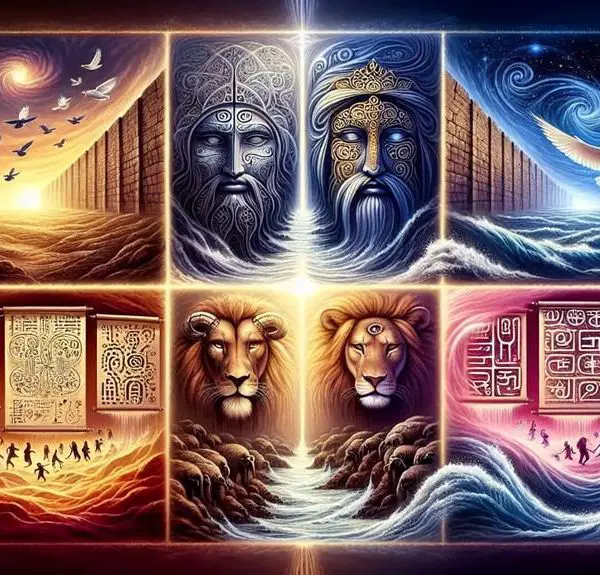Beyond our understanding, the Bible reveals astonishing facts about heaven that promise eternal bliss and wonder, inviting us to delve deeper.

Facts About Heaven in the Bible
Have you ever wondered what lies beyond the pearly gates?
The Bible paints a vivid picture of heaven, a place of unmatched beauty and eternal peace.
You'll discover that heaven is not just a destination, but a promise of a new beginning, free from suffering and filled with worship and joy.
But what does it take to get there, and who do you meet?
The answers might surprise you and shift your perspective on life's ultimate journey.
Let's embark on this exploration together, uncovering the mysteries that await beyond the veil.
Key Takeaways
- Heaven is depicted as a place of peace, divine presence, and eternal joy, merging physical and spiritual realms.
- Angels and righteous souls inhabit heaven, serving God and enjoying eternal life in His presence.
- Entry into heaven requires faith, grace, repentance, and baptism, emphasizing a spiritual journey and commitment.
- Worship in heaven involves celestial music, communal praise, and promises freedom from suffering, direct communion with God, and eternal peace.
The Nature of Heaven

While various interpretations exist, the Bible depicts heaven as a place of ultimate peace and divine presence, distinct from the earthly realm in its perfection and harmony. This depiction suggests a realm imbued with celestial beauty and eternal joy, elements that significantly contribute to the scholarly understanding of heaven's nature. You'll find that the biblical narrative offers glimpses into a domain where the physical and spiritual merge, presenting an environment that transcends human comprehension yet invites a deep yearning for its promise.
Analyzing the descriptions provided in Scripture, you encounter a multifaceted portrayal of heaven. It isn't merely a location but a state of being, characterized by an absence of suffering and the presence of God. The emphasis on celestial beauty highlights heaven's aesthetic dimension, suggesting an environment that surpasses earthly beauty in both scale and quality. This aspect of heaven is crucial, as it symbolizes the perfection and holiness of the divine realm.
Furthermore, the concept of eternal joy in heaven points to a profound emotional and spiritual fulfillment. Unlike earthly happiness, which is often transient and susceptible to external circumstances, the joy found in heaven is depicted as everlasting and unchanging. This promise of eternal joy serves as a cornerstone of faith for many believers, offering hope and consolation amidst the trials of life.
Heaven's Inhabitants

You'll find that Heaven's inhabitants play crucial roles in the biblical depiction of the afterlife. Angels serve as messengers and agents of God's will, while the souls of the righteous are rewarded with eternal life in God's presence.
Central to Heaven, however, is God's throne, symbolizing divine authority and governance over the universe.
Angels' Role
Angels, as celestial beings, play a multifaceted role in the realm of Heaven, serving not only as messengers of the divine but also as guardians and warriors according to biblical descriptions. Within the angelic hierarchy, different orders or choirs are assigned specific duties, reflecting a structured and purpose-driven organization.
Guardian duties, in particular, showcase angels' commitment to protecting and guiding individuals on Earth, a task mentioned in various scriptures. This role underscores the belief in a personal connection between Heaven's inhabitants and humans, emphasizing the angels' proactive engagement in the mortal world.
Their warrior aspect, often depicted in biblical narratives, highlights their involvement in spiritual battles, protecting the righteous and combating forces of evil, further solidifying their integral place in the heavenly domain.
Righteous Souls' Reward
In the theological framework of the Bible, Heaven serves as the ultimate reward for righteous souls, recognizing their moral and spiritual fidelity on Earth. You're promised eternal joy and the privilege of engaging in celestial duties, reflecting your unwavering faithfulness.
Aspect |
Description |
|---|---|
Eternal Joy |
Unending happiness in the presence of the divine. |
Celestial Duties |
Tasks and responsibilities in the heavenly realm. |
Spiritual Fidelity |
Loyalty to divine principles throughout earthly life. |
Moral Integrity |
Upholding ethical standards as a testament to faith. |
Ultimate Reward |
Heaven as the culmination of righteous living. |
This framework emphasizes a direct correlation between one's earthly conduct and their eternal fate, underscoring Heaven as not just a destination, but a deserved reward.
God's Heavenly Throne
At the heart of Heaven's divine realm sits God's throne, around which the inhabitants of this celestial kingdom gather, reflecting the structured hierarchy and spiritual significance within this sacred space.
This throne isn't just a piece of celestial architecture; it's a profound symbol of God's sovereign rule and authority over the universe. Throne symbolism throughout biblical texts underscores not only God's majesty and power but also His justice and mercy as the divine judge and protector of His creation.
The positioning of the throne and its accessibility to Heaven's inhabitants illustrate a meticulously ordered cosmos, where divine governance and celestial hierarchy are palpably manifested. Understanding this throne's role within Heaven's confines allows you to grasp the intricate relationship between divine authority and the spiritual order governing this celestial realm.
Entrance Requirements

You'll find that the Bible outlines specific entrance requirements for heaven, emphasizing faith and grace, alongside repentance and baptism. These components aren't merely ritualistic but are deeply intertwined with personal transformation and the acknowledgment of divine sovereignty.
Understanding their biblical foundation and interrelation is crucial for a comprehensive grasp of the spiritual prerequisites for entry into heaven.
Faith and Grace
To enter heaven, according to biblical teachings, one must possess faith in God and receive His grace, principles that are foundational yet complex in Christian doctrine.
Exploring these divine mysteries, scholars emphasize that faith isn't merely intellectual assent but a deep, personal trust in God's promises. This trust catalyzes spiritual growth, transforming the believer's life and actions.
Grace, on the other hand, is understood as God's unmerited favor towards humanity, a gift that can't be earned through deeds but is freely given. It's through grace that individuals are empowered to live lives that reflect their faith.
Thus, faith and grace aren't standalone concepts but are intricately linked, each nurturing and sustaining the other in the believer's journey towards spiritual maturity and, ultimately, entrance into heaven.
Repentance and Baptism
Repentance and baptism serve as essential gateways for believers seeking entrance into heaven, as delineated in biblical scripture. In analyzing these concepts, it's crucial to consider both their historical context and cultural interpretations.
- Historical Context: Initially, these practices were deeply intertwined with Jewish purification rituals, evolving significantly in the Christian tradition.
- Cultural Interpretations: Over centuries, diverse Christian denominations have developed varied understandings and practices surrounding repentance and baptism.
- Symbolism and Significance: They symbolize a believer's decision to turn away from sin and embrace a new life in Christ.
- Scriptural Foundations: Passages such as Acts 2:38 highlight the importance of repentance and baptism as prerequisites for receiving the Holy Spirit and, by extension, entry into heaven.
This analysis underscores the profound spiritual implications these practices hold within the Christian faith.
The New Jerusalem

The New Jerusalem, as depicted in the Bible, represents the culmination of divine promise, serving as a central symbol of salvation and eternal peace for believers. This heavenly city, with its precise city dimensions and rich architectural symbolism, invites a deeper understanding of its significance.
The city's dimensions, as described in Revelation, are not just numbers but embody profound spiritual truths. The square shape and equal length, width, and height symbolize perfection and the comprehensive nature of God's salvation. Architectural symbolism further enriches this imagery, with materials like gold and precious stones illustrating the city's divine purity and the value of the eternal life promised to believers.
To convey a deeper meaning, consider the following table:
Aspect |
Symbolic Meaning |
|---|---|
Square Shape |
Eternal perfection and God's completeness |
Equal Dimensions |
God's balanced and comprehensive salvation |
Gold |
Divine purity and incorruptibility |
Precious Stones |
The invaluable nature of eternal life |
Twelve Gates |
Access for all tribes of Israel, symbolizing inclusivity |
This table serves as a concise summary of the symbolic depth found in the New Jerusalem's description. Each element not only contributes to the city's awe-inspiring beauty but also carries layers of meaning, enriching the believer's understanding of heaven.
As you reflect on the New Jerusalem, it's essential to grasp these symbolic elements, recognizing the city as more than a physical locale but a representation of God's ultimate promise to His people.
Heavenly Worship

Reflecting on the New Jerusalem's symbolic richness invites a deeper exploration of heavenly worship, a core aspect of believers' eternal experience. Scriptures offer glimpses into celestial worship practices, portraying a setting where celestial music and adoration permeate the environment. This aspect of heaven isn't just about singing or music; it's an intricate part of the divine fellowship, encapsulating praise, gratitude, and a profound recognition of God's sovereignty.
In the biblical narrative, heavenly worship is characterized by several key elements:
- Celestial Music: Harps and choirs of angels are often depicted, producing harmonies that transcend earthly capabilities. This music isn't just for entertainment but serves as a medium for expressing divine glory.
- Worship Practices: These include bowing, the casting of crowns before God's throne, and choruses of 'Holy, Holy, Holy,' signifying reverence and deep adoration.
- Communal Participation: Unlike individualistic expressions of faith, heavenly worship involves a collective gathering of saints and angels, emphasizing unity in praise.
- Continuous Praise: The depiction of worship in heaven isn't confined to specific moments but is an ongoing state, reflecting an eternal acknowledgment of God's majesty.
Analyzing these components reveals that heavenly worship isn't a passive experience but an active engagement with the divine. It underscores a transition from earthly worship practices, which are often constrained by time and space, to an eternal, unbounded adoration of God. Celestial music and worship practices serve not just as acts of reverence but as conduits for the believer's participation in the divine presence, promising an experience that's both profound and transformative.
The Promise of No Suffering

One of the most compelling aspects of biblical descriptions of heaven is the promise that there will be no suffering. This concept is not merely a comforting thought but is deeply embedded in the scripture, offering a profound hope for believers. The notion of eternal peace and unending joy is central to the Christian understanding of the afterlife, where the trials and tribulations of earthly life give way to a state of blissful existence.
The biblical portrayal of heaven emphasizes a place where pain, sorrow, and suffering are absent. This is not an abstract idea but a concrete promise that has significant implications for the believer's perspective on suffering and the afterlife. The assurance of a future devoid of pain serves as a source of comfort and encouragement, reinforcing the believer's faith in a just and merciful God.
Aspect |
Description |
|---|---|
Eternal Peace |
Complete absence of conflict and suffering. |
Unending Joy |
Continuous state of happiness and fulfillment |
Divine Presence |
Direct communion with God. |
Holiness |
Freedom from sin and its consequences. |
This table highlights key elements associated with the promise of no suffering in heaven, underscoring the transformative nature of this divine assurance. Eternal peace and unending joy are not just lofty ideals but tangible realities promised to believers. The expectation of a future free from pain and sorrow not only offers solace but also shapes the Christian's understanding of suffering, viewing it as a temporary condition that will ultimately give way to an eternal state of bliss and communion with God.
Visions of Heaven

Throughout history, various visions of heaven have captivated believers, offering them glimpses into an afterlife filled with divine splendor and eternal joy. These accounts, found within the pages of the Bible, present a multifaceted picture of what awaits beyond this life. By examining these visions, you can gain insight into the complexities and wonders that define the celestial realm.
The biblical narratives offer detailed descriptions that highlight key features of heaven, such as:
- Heavenly gardens: These lush, vibrant landscapes are frequently mentioned, symbolizing a place of rest and communion with the divine. The imagery of gardens brings to mind a state of perfection and abundance, reflecting an ideal environment free from the decay and desolation of the earthly realm.
- Celestial hierarchy: Scriptures delineate a structured order among celestial beings, indicating a complex hierarchy within the heavenly realm. This aspect suggests an organized system of governance and worship, with different roles and functions assigned to various angelic beings.
- Streets of gold and precious stones: The opulence of heaven is often depicted through the use of precious materials, signifying not just wealth but the uncorrupted and refined nature of the heavenly domain.
- Eternal worship and service: Visions of heaven emphasize the continuous worship and service to God by its inhabitants, pointing to a central purpose of existence in the afterlife.
These biblical accounts of heaven invite believers to ponder the mysteries of the afterlife, providing a glimpse into a world beyond human understanding. The depictions of heavenly gardens and a celestial hierarchy specifically underscore the grandeur and organized complexity of the heavenly realm, offering reassurance and hope for a future in the presence of the divine.
Frequently Asked Questions
How Do Different Christian Denominations Interpret the Concept of Heaven Differently?
You'll find Christian denominations interpret heaven's concept uniquely, influenced by their theological perspectives.
They delve into the idea of a heavenly hierarchy and how souls ascend to paradise.
Denominational rituals, like baptism and communion, are believed to prepare believers for this divine realm.
Each denomination weaves its understanding into a broader, complex tapestry of belief, analyzing texts and traditions to offer distinct visions of what awaits beyond.
Are There Any Biblical References to Animals or Pets Being Present in Heaven?
Just like a puzzle isn't complete without every piece, many wonder if heaven will include all our earthly companions, including pets.
The Bible doesn't explicitly mention animals in heaven, but it's rich in animal symbolism, hinting at their importance in God's creation. This absence leaves room for interpretation about eternal companionship with animals.
The scholarly analysis leans on the broader themes of creation's renewal, suggesting a place for all God's creatures in the afterlife.
How Does the Bible Address the Concept of Time in Heaven Compared to Earthly Time?
You're exploring how time in heaven is depicted as distinct from earthly time.
The Bible suggests a concept of an 'eternal moment' or a 'timeless existence' in heaven, contrasting sharply with our linear perception of time.
This portrayal implies that, in heaven, past, present, and future may converge into a singular, eternal now, offering a profound shift in understanding from our temporal, earthly experiences.
This notion invites deeper reflection on eternity's nature and its implications.
In Biblical Context, How Is the Relationship Between Heaven and the Universe or Space Described?
You're diving into how the Bible depicts the connection between heaven and the cosmos.
It's fascinating to explore the biblical cosmic geography and celestial realms. Scripture presents heaven not just as a distant, mystical place but intricately linked with the universe's fabric.
This relationship suggests a divine order and purpose, transcending mere physical space. The depiction is rich, pointing to a complex understanding of heaven's place within the broader tapestry of creation.
What Does the Bible Say About the Activities or Occupations of the Inhabitants of Heaven Beyond Worship?
You're exploring what the Bible reveals about heavenly inhabitants' activities beyond worship. It's not just about adoration; there's a hint of heavenly governance and celestial creativity at play.
This perspective suggests that those in heaven engage in roles that contribute to the order and beauty of the celestial realm. They possibly partake in tasks of governance and creative endeavors, painting a picture of heaven as a place of dynamic involvement and divine artistry.
Conclusion
In conclusion, the biblical depiction of heaven emerges as a realm of unfathomable beauty and eternal peace. Imagine wandering through the radiant streets of the New Jerusalem, amidst beings of pure light and a divine chorus that resonates with the harmony of creation. Here, the anguish of earthly existence dissolves, leaving only joy and worship in the presence of the Divine.
This eternal promise isn't just a place but an invitation to transcendence, contingent upon spiritual adherence and moral purity.



Sign up